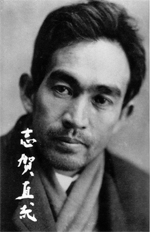◀ previous session | next session ►
Session 06—Th, Feb 2: 明治・大正期:志賀直哉、しがなおや (1883-1971) (1 of 4)
Topics for this session 
❖ 1910「髪剃」 かみそり (in Eng. trans.)
❖ 1913「源清兵衛と瓢箪」せいべえとひょうたん(in Eng. trans.)
❖ 1913「笵の犯罪」 はんのはんざい
Thoughts*
Shiga had a long writing career. We are looking at works published right at the end of the Meiji period or very early in the Taishō period. Shiga is known best for his short fiction, which, compared to Doppo, is terse and tightly written. You should notice immediately strong contrasts between these writers in sentence structure, "voice" and other stylistic issues. Doppo meanders through repetition and loosely connected phrases; Shiga is all business and establishes staccato through short, crystal clear sentences and the sharp exchange of dialogue. Notice how the clarity of style contributes to the tension between the desire for clarity by the judge (an attitude encouraged in the reader, too) and the opaque nature of simple statements that would seem to point to a definitive reality, but don't.
Required—to be completed for today's session
✓ Read「笵の犯罪」pages 68 - 71
✓ Read in English translation "The Razor", a story that precedes this one by a few years but is close in theme.
✓ Optional: If you wish, read in English translation the very short "Seibei's Gourds"—a nice little story that is an excellent example of Shiga's expert use of the very short fiction format.